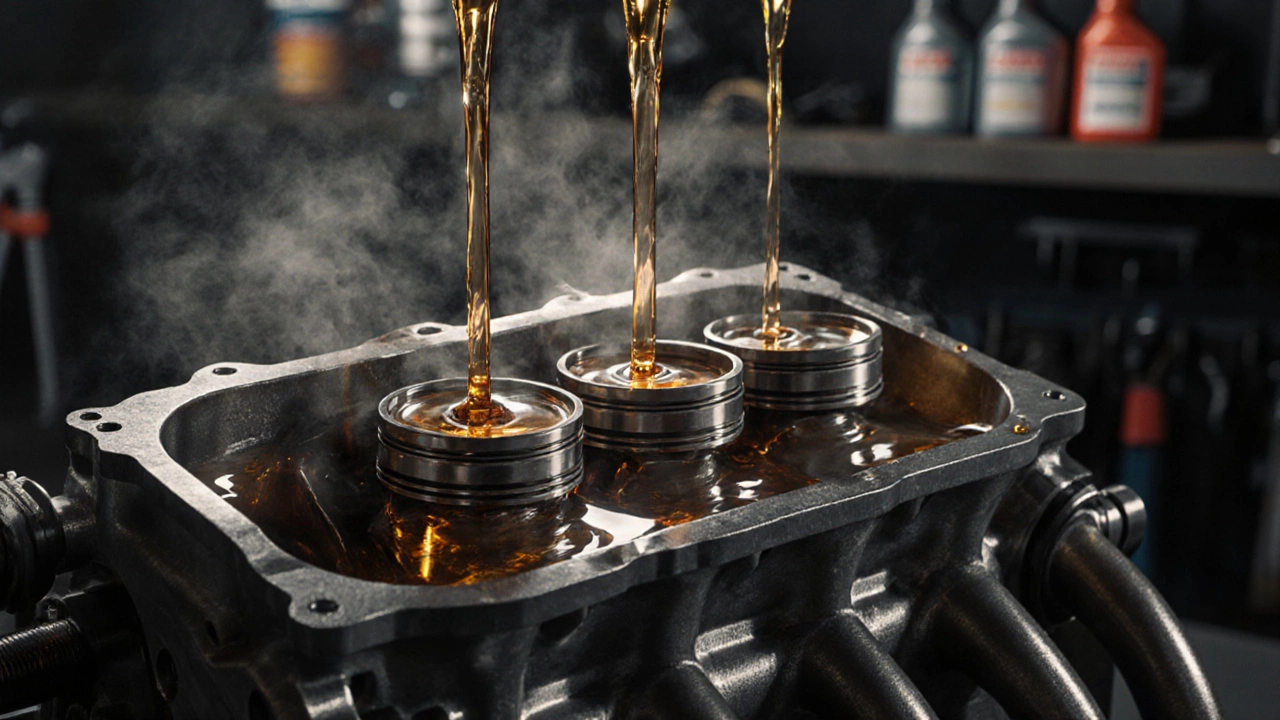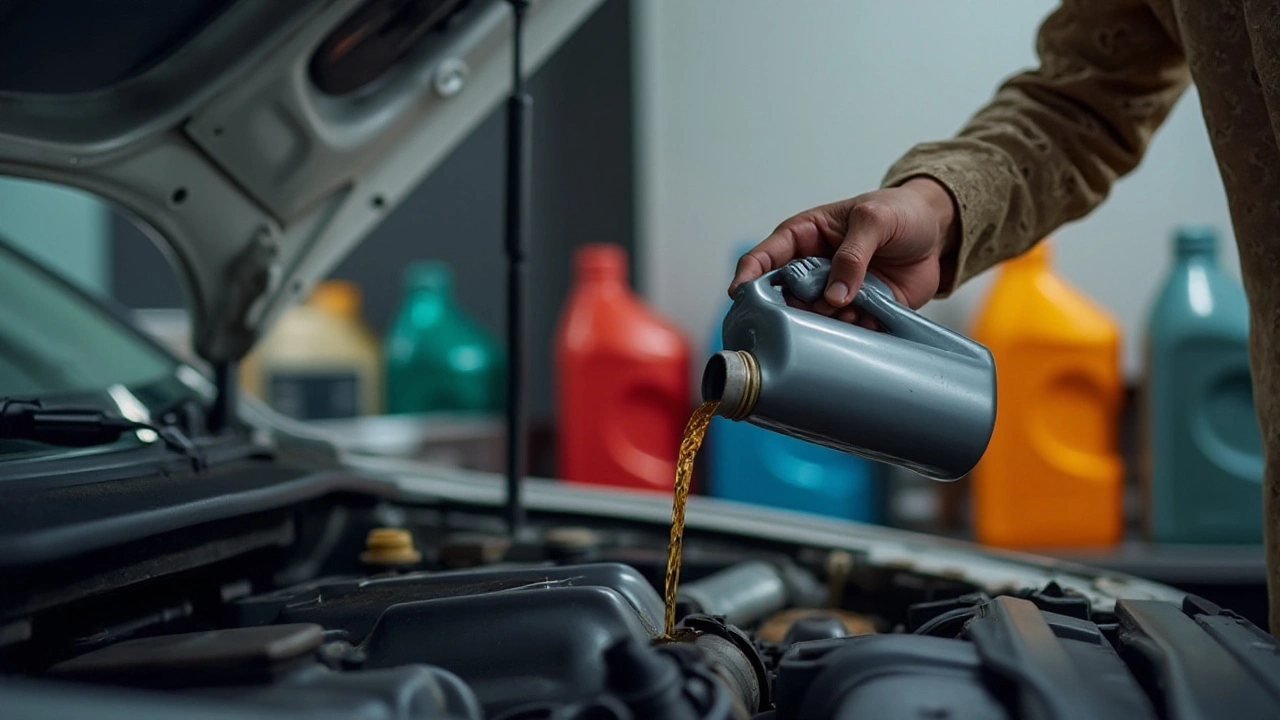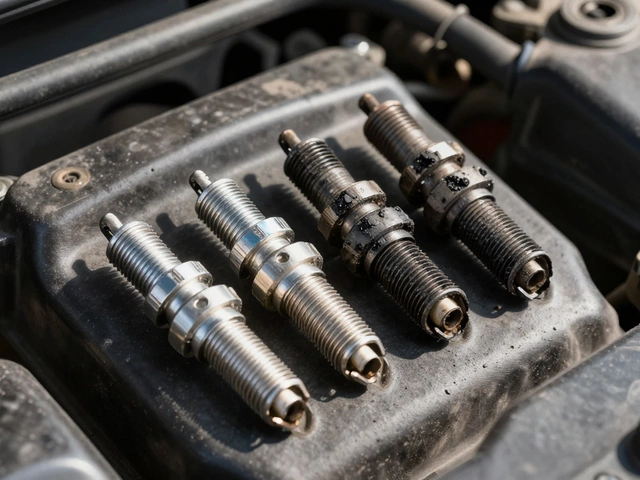Engine Oil: Choose, Change, and Keep Your Engine Running Smoothly
Engine oil does more than just keep things slick. It cools hot parts, cleans away grit, and protects metal surfaces from wear. If you skip oil changes or use the wrong grade, you’ll see sludge, loss of power, and pricey repairs. Let’s cut the jargon and get straight to what matters for your car.
Choosing the Right Engine Oil
First thing – look at the viscosity rating on the bottle. The numbers like 5W-30 tell you how the oil flows at cold start (the "5W") and at operating temperature (the "30"). Your owner’s manual is the gold standard; it lists the recommended range for your engine. If you live in a cold climate, a lower "W" rating helps the engine start easier. In hot climates, a higher second number can keep the oil from thinning out.
Next, decide between conventional, synthetic blend, or full synthetic. Conventional oil is cheap and works fine on older, low‑mileage cars. Synthetic blends give you a bit more protection without the full price tag, while full synthetic offers the best heat resistance, sludge control, and longer drain intervals – perfect for high‑performance or turbocharged engines.
Don’t forget the oil filter. A good filter traps metal particles and contaminants before they circulate. Cheap filters can let grit slip through, defeating the oil’s purpose. Look for reputable brands that match your vehicle’s flow rate and size.
When & How to Change Your Oil
Most modern cars now recommend oil changes every 7,500 to 10,000 miles, but that’s only if you use synthetic oil and drive under normal conditions. If you do a lot of short trips, city traffic, or tow heavy loads, stick to the 5,000‑mile mark. A quick visual check can help – pull out the dipstick, wipe it clean, re‑insert, and pull again. If the oil looks dark and gritty, it’s time for a change.
Changing oil yourself is easier than you think. Gather the right tools: a socket for the drain plug, a catch pan, a funnel, and a new filter. Warm up the engine for a few minutes to get the oil flowing, then turn off and let it settle. Remove the drain plug, let the old oil drain out, replace the plug, swap the filter, and pour in the new oil using the funnel. Check the level with the dipstick and add more if needed.
After the change, listen for any odd noises and watch the temperature gauge for a few minutes. If everything stays normal, you’ve done a solid job. Keep a log of mileage, oil type, and filter brand – it saves headaches later when something goes wrong.
Skipping oil changes or using the wrong grade can turn fresh oil into a thick sludge that clogs passages and raises engine temperature. That can lead to low oil pressure warnings, metal‑to‑metal contact, and ultimately expensive engine rebuilds. Staying on top of oil maintenance pays off in smoother rides, better fuel economy, and a longer‑lasting engine.
Got questions about a specific oil brand or how to choose for a high‑mileage vehicle? Browse our related posts like “What Happens If You Don’t Change Engine Oil?” and “Engine Oil Change Interval Guide” for deeper dives. Keeping your engine oil in check is the simplest way to protect your car’s heart – and your wallet.

What Is Engine Oil Used For? The Simple Truth About Keeping Your Engine Alive
Engine oil isn't just for lubrication-it cools, cleans, seals, and protects your engine. Learn what it actually does and why skipping oil changes is a costly mistake.
CONTINUE READING
Engine Oil: Too Much vs Too Little—Which Is Worse?
Is it more dangerous to overfill or underfill your engine oil? This article breaks down the risks and headaches tied to both scenarios and offers real-world advice for everyday drivers. Get the facts on what happens inside your engine when oil levels go wrong. Learn how to spot trouble before it wrecks your ride. Drive smarter with clear tips for checking and topping off your oil the right way.
CONTINUE READING
Car Engine Oil Sounds: What to Listen for When Your Car's Low
Car engines have a way of telling you when they're running low on oil, and the sounds aren't exactly pleasant. This article breaks down what noises to watch out for before serious damage happens. You'll find plain explanations, examples of specific sounds, and tips on catching oil-related engine trouble early. If you've ever wondered what a dry engine really sounds like, read on. Understanding these warning signs can save you a ton in repair bills.
CONTINUE READING
How Long Does Oil Last in a Car? A Comprehensive Guide
Engine oil is crucial for your car's health, acting like the bloodstream of your vehicle. Understanding how long oil lasts and when to change it can save you from costly repairs and keep your car running smoothly. Factors like driving habits, type of oil, and vehicle usage affect oil longevity. This guide provides practical insights and tips to help you manage and extend the life of your car's engine oil.
CONTINUE READING
When to Avoid Using Synthetic Engine Oil
Synthetic oil offers many benefits, but it's not always the best choice for your engine. Understanding when not to use synthetic oil can save you money and keep your engine running smoothly. In this article, uncover scenarios where conventional oil may be more suitable, such as with certain older vehicle models or specific engine types. Learn how to make the best oil choice for your vehicle's needs.
CONTINUE READING








